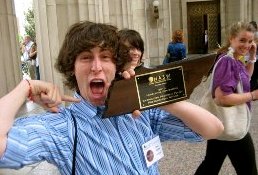 Students from the Social Welfare Policy & Services II class recently competed in the poster presentation contest at the Tennessee Legislature during the 2010 Social Work Day on the Hill. Their policy analysis, “Restorative Justice for Some,” won first prize. Congratulations to these students: Andrew Aichele, Michelle Barnett, Katie Czerwinski, Shauna Daniels, Amy Dunning, Stephanie Hall, Cheyenne Metzger, Tom Rigsby, Lindsay Sechser, Serena Sherrill, Emma Shouse and Courtney Weeks.
Students from the Social Welfare Policy & Services II class recently competed in the poster presentation contest at the Tennessee Legislature during the 2010 Social Work Day on the Hill. Their policy analysis, “Restorative Justice for Some,” won first prize. Congratulations to these students: Andrew Aichele, Michelle Barnett, Katie Czerwinski, Shauna Daniels, Amy Dunning, Stephanie Hall, Cheyenne Metzger, Tom Rigsby, Lindsay Sechser, Serena Sherrill, Emma Shouse and Courtney Weeks.
Daily Archives: April 30, 2010
Pine Ridge 2010 Cultural Experiences
The 2010 spring cultural activities trip is a key part of the Belmont-Pine Ridge Community Partnership. It is an important phase in the building of ongoing relationships and sustainable activities between Belmont University and the communities of the Lakota (Sioux) people of the Pine Ridge Indian Reservation in South Dakota.
During the week of May 16-23, participants will immerse in an educational experience led by Leonard Little Finger and Basil Brave Heart, traditional Lakota elders and experienced educators of the Pine Ridge community. Selected participants include a variety of members of the Belmont community of students, faculty, staff, and friends. During the 6 days on site, participants will immerse in educational experiences where they will learn the beauty and strengths of traditional Lakota ways and reflect on whether the lessons learned have relevance for them personally and for modern times.
Readings, lectures, and discussions both at Belmont and at Pine Ridge will cover the significance of history and policies, spirituality and religion, relationship to nature, ceremonies, language, dance and music, cultural ways that are specific to the Lakota people, and the role of the Belmont and Pine Ridge as partners. Activities include a number of visits to sacred and historical sites (Wounded Knee, Black Hills, Badlands, etc.) and participation in a sweat lodge prayer ceremony. A special emphasis will be placed on studying the cultures of the Lakota as a way of developing individual cultural competence. Healthy cultural competence includes an understanding of our own prejudices and worldviews as well as those of others and the ability to communicate effectively with peoples of other cultures.
